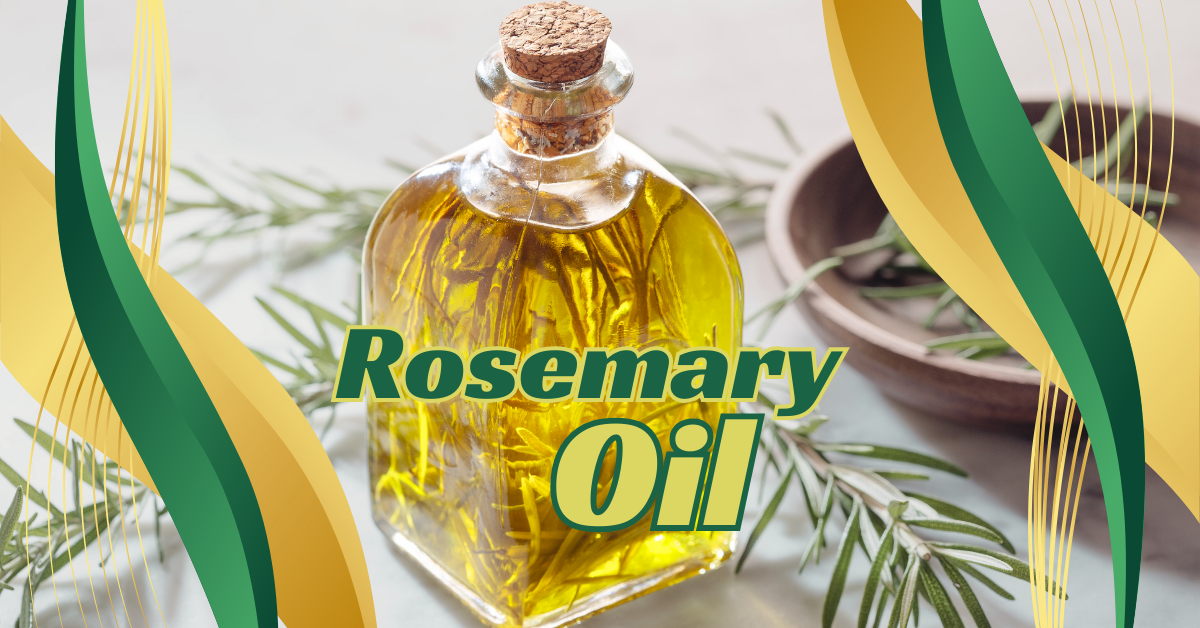Making your own rosemary oil at home is easier than you think, and it comes with a variety of benefits for your hair, skin, and overall well-being. This fragrant herb, known for its natural healing properties, can be transformed into a versatile oil that you can use in your beauty routine, for aromatherapy, or even in cooking.
In this detailed guide, we’ll walk you through the steps of making rosemary oil using both fresh and dried rosemary. We’ll also share tips on choosing the best carrier oils, storage techniques, and the numerous ways to incorporate this oil into your daily life.
1. How to Make Rosemary Oil at Home: A Simple Step-by-Step Guide
If you’re wondering how to make rosemary oil from scratch, don’t worry—it’s a straightforward process that requires just a few ingredients. Here’s a quick recipe that you can follow to create homemade rosemary oil.
Ingredients You’ll Need:
- Fresh or dried rosemary (1 cup)
- Carrier oil (such as olive oil, coconut oil, or almond oil – 2 cups)
- A glass jar with a tight seal
- A strainer or cheesecloth
Instructions:
- Prepare the rosemary: If you’re using fresh rosemary, wash and thoroughly dry the sprigs. If using dried rosemary, make sure it’s free of any moisture.
- Combine the rosemary and oil: Place the rosemary in a clean glass jar and cover it completely with your chosen carrier oil.
- Infuse the oil: Seal the jar and place it in a warm, sunny spot for about 2-4 weeks. Shake the jar every few days to mix the ingredients.
- Strain the oil: After the infusion period, strain the mixture using a cheesecloth or fine strainer to remove the rosemary. Pour the strained oil into a clean jar.
- Store the oil: Keep the rosemary oil in a cool, dark place. Properly stored, it can last for up to 6 months.
Now you have a fragrant, homemade rosemary oil that’s ready to use!
2. 5 Incredible Benefits of Using Rosemary Oil for Hair and Skin
Once you’ve made your rosemary oil, it’s time to enjoy its numerous benefits. This essential oil has been praised for its natural healing and rejuvenating properties, especially for hair and skin.
Top Benefits of Rosemary Oil:
- Promotes Hair Growth: Rosemary oil stimulates blood circulation to the scalp, encouraging hair growth and reducing hair loss. It’s an excellent natural remedy for thinning hair.
- Improves Scalp Health: It helps to soothe dry, itchy scalps, reducing dandruff and flakiness.
- Fights Acne: The anti-inflammatory properties of rosemary oil make it effective in reducing acne and calming irritated skin.
- Anti-Aging: Regular use of rosemary oil can improve skin elasticity, reducing the appearance of fine lines and wrinkles.
- Soothes Muscle Aches: When massaged into the skin, rosemary oil can help relieve muscle tension and joint pain.
By incorporating rosemary oil into your beauty routine, you can naturally support both your hair and skin health.
3. Fresh vs. Dried Rosemary: Which Is Better for Making Rosemary Oil?
One of the most common questions when making rosemary oil is whether to use fresh or dried rosemary. Both have their advantages, but here’s a breakdown of which might be better for you.
Using Fresh Rosemary:
- Pros: Fresh rosemary gives a stronger fragrance and has higher levels of essential oils, making it ideal for potent rosemary oil.
- Cons: Fresh rosemary contains moisture, so it’s important to ensure it’s completely dry before infusing to avoid mold.
Using Dried Rosemary:
- Pros: Dried rosemary is more convenient and has a longer shelf life, plus you don’t need to worry about moisture.
- Cons: The oil made from dried rosemary might be slightly less fragrant than oil made from fresh sprigs.
Ultimately, both options work well, but fresh rosemary tends to produce a more aromatic oil.
4. What You Need: Best Carrier Oils for Homemade Rosemary Oil
Choosing the right carrier oil is essential when making rosemary oil. The carrier oil helps dilute the rosemary’s essential oils, making it safe for topical application while also nourishing the skin and hair.
Top Carrier Oils to Use:
- Olive Oil: A popular choice for its richness in vitamins and antioxidants. It’s excellent for hair treatments and skin hydration.
- Coconut Oil: Known for its antimicrobial properties, coconut oil is a fantastic option for scalp and hair health.
- Almond Oil: Lightweight and easily absorbed, it’s perfect for those looking to use rosemary oil as a facial moisturizer.
- Jojoba Oil: Mimics the skin’s natural oils and is ideal for all skin types, especially sensitive or acne-prone skin.
Each carrier oil has its own unique benefits, so you can choose one based on your personal preferences and the intended use of your rosemary oil.
5. How to Use Rosemary Oil for Hair Growth and Healthy Scalp
One of the most popular uses of rosemary oil is for promoting hair growth and maintaining a healthy scalp. Here’s how to effectively use it in your hair care routine.
How to Apply Rosemary Oil for Hair:
- Scalp massage: Mix a few drops of rosemary oil with a carrier oil (such as coconut or olive oil) and massage it into your scalp. Leave it on for at least 30 minutes before rinsing.
- Add to shampoo: Add a few drops of rosemary oil to your regular shampoo to enhance hair growth benefits during each wash.
- Leave-in treatment: For an overnight treatment, mix rosemary oil with a lightweight carrier oil like jojoba, and apply it to the scalp before bed.
Regular application can help prevent hair loss and strengthen your hair from the roots.
6. How Long Does Homemade Rosemary Oil Last? Storage Tips
When stored properly, homemade rosemary oil can last a long time. However, there are a few important storage tips to ensure your oil stays fresh and effective.
Storage Tips for Rosemary Oil:
- Use a dark glass bottle: Light can degrade the quality of the oil, so always store it in a dark glass container.
- Keep it cool: Store your rosemary oil in a cool, dry place to extend its shelf life.
- Check for spoilage: Over time, homemade oils can go rancid. If the oil develops an off smell, it’s time to discard it.
On average, homemade rosemary oil can last for up to 6 months if stored properly.
7. Can You Use Dried Rosemary to Make Rosemary Oil?
Yes, you can use dried rosemary to make rosemary oil, and it’s actually a convenient option for those who don’t have fresh rosemary available.
How to Make Rosemary Oil with Dried Rosemary:
- Follow the same method as you would with fresh rosemary, but use dried sprigs instead.
- Infuse for 2-4 weeks, just like with fresh rosemary.
- Strain and store as usual.
The oil made from dried rosemary will be slightly milder in fragrance but just as effective for skincare and hair treatments.
How to Make Rosemary Oil with Fresh Rosemary: A Detailed Recipe
While dried rosemary is convenient, using fresh rosemary can bring a more vibrant fragrance and added potency to your rosemary oil. Here’s a detailed recipe on how to make rosemary oil using fresh rosemary.
Ingredients You’ll Need:
- Fresh rosemary sprigs (1 cup)
- Carrier oil (such as olive, almond, or grapeseed oil – 2 cups)
- A slow cooker or double boiler
Instructions:
- Prepare the rosemary: Wash the fresh rosemary and let it dry completely. Excess moisture can cause the oil to spoil faster, so it’s important to ensure the sprigs are dry.
- Heat the oil: Place the carrier oil in a slow cooker or double boiler and heat it gently over low heat.
- Infuse the rosemary: Add the fresh rosemary sprigs to the oil and let it simmer on low for 2-3 hours. This process helps release the essential oils from the rosemary without overheating.
- Strain the oil: After the infusion, carefully strain the oil into a glass container using a cheesecloth to remove any rosemary remnants.
- Store your rosemary oil: Pour the strained oil into a dark glass bottle and store it in a cool, dark place.
This method creates a highly potent rosemary oil that can be used for both skincare and hair treatments.
How to Store Homemade Rosemary Oil for Maximum Freshness
Storing homemade rosemary oil properly is essential for maintaining its quality and ensuring it remains safe to use for months. Here are a few expert tips on how to store your rosemary oil for maximum freshness.
Storage Tips:
- Use airtight containers: Always store your rosemary oil in a tightly sealed, dark glass bottle to protect it from light and air exposure.
- Keep in a cool place: Avoid storing the oil near heat sources or direct sunlight, as heat can degrade the oil over time.
- Check regularly: Over time, even properly stored oils may spoil. Always check the scent and texture before use; if it smells rancid or changes consistency, it’s best to discard it.
When stored correctly, homemade rosemary oil can last for up to 6 months, offering all the same benefits as store-bought versions.
For more exciting blogs, visit our homepage Magzineco.
Conclusion
Making your own rosemary oil is a rewarding and simple process that provides countless benefits for your hair, skin, and overall wellness. Whether you use fresh or dried rosemary, this versatile oil is a wonderful addition to your DIY beauty routine. With proper storage and the right carrier oils, your homemade rosemary oil can last for months, offering a natural and effective solution for hair growth, scalp health, and skincare.
FAQs About How to Make Rosemary Oil
- Can I use dried rosemary to make rosemary oil?
Yes, dried rosemary works well for making rosemary oil, and it’s easier to store. - How long should I infuse rosemary in oil?
You should infuse rosemary in oil for about 2-4 weeks for the best results. - What are the benefits of rosemary oil for hair?
Rosemary oil promotes hair growth, improves scalp health, and reduces dandruff. - What’s the best carrier oil for rosemary oil?
Olive oil and coconut oil are great options, depending on your preference. - Can rosemary oil help with acne?
Yes, rosemary oil has anti-inflammatory properties that can help reduce acne. - Is rosemary oil good for hair loss?
Yes, regular use of rosemary oil can help reduce hair loss and encourage new growth. - How do I store homemade rosemary oil?
Store your oil in a dark glass bottle in a cool, dry place to maintain its freshness. - How often can I use rosemary oil on my scalp?
You can apply rosemary oil to your scalp 2-3 times a week for the best results. - Can I use fresh rosemary to make rosemary oil?
Yes, fresh rosemary is an excellent option for making aromatic rosemary oil. - How long does homemade rosemary oil last?
Properly stored, homemade rosemary oil can last up to 6 months.




